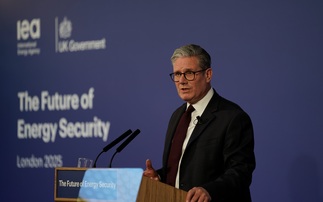They are not going to form the next government, but the Green Party manifesto remains a hugely important document
What is the purpose of the Green Party? In an electoral system stacked against them what is the point of a small party that will always struggle to make a meaningful electoral impact?
It is a fair question and one that many voters obviously ask themselves as the Party consistently struggles to convert commendable showings in local and European elections into MPs at a general election - a struggle the polls suggest is likely to be repeated over the coming weeks as the squeeze on its vote continues.
But there remain good reasons to cheer the Greens on, many of which are to be found in today's manifesto. For the purpose of the Greens exceeds far beyond their Sisyphean efforts to secure the levers of political power, and instead centres on the soft power exerted by publicly championing environmental and progressive policies that are right at the fringe of public acceptability.
Throughout the Party's history it has promoted policies on issues such as work-life balance, animal welfare, drugs reform, immigration, and, of course, the environment that were once seen as hugely radical and are now either mainstream or fast heading in that direction. Caroline Lucas has emerged as a political champion for far more than the three to four per cent of people who actually tick the Green box in the polling booth.
The hugely important pull that the Greens can have on the Overton Window has been present throughout this election campaign, as each and every day has seen the main parties announce genuinely ambitious climate plans that would once have been the sole preserve of those doomed to lose their deposits while wearing green rosettes.
As such, the Greens still-radical manifesto provides both a steer as to where the climate policy debate could be heading over the coming years and some genuinely actionable policies that the main Parties could soon steal.
On the symbolic front, there are good reasons why Labour has shelved plans for a net zero by 2030 target and why the Lib Dems won't go beyond £100bn over the course of the Parliament in their climate emergency spending programme. Trying to decarbonise entirely over a decade would push up costs, risk alienating much of the public, require polluting assets to be seized, and lead to a huge skills crunch. A spending blitz makes sense when the cost of borrowing is so low, but too much fiscal largesse would test the patience of the markets, especially if the UK is going to hurl itself into another wave of Brexit-related uncertainty.
But the Greens refusal to compromise on either front - its insistence on a net zero by 2030 target and a £100bn a year investment programme - does provide an important reminder to the other Parties and the voting public that there are significant risks with decarbonising too slowly. 2030 may be too fast, but there remains a credible argument that 2050 is too slow. Coming on the same day as PwC again warned that the UK and the world as a whole are still nowhere near the decarbonisation rate needed to deliver net zero by 2050 it is crucial that the Greens continue to bang the drum for bolder action.
Equally, it is refreshing to hear someone in frontline politics make the moral case for borrowing to invest in low carbon infrastructure. Many green businesses would welcome the stimulus that would come from a properly funded Green New Deal and in arguing that there is nothing wrong with younger generations picking up the tab for clean infrastructure that they benefit wrong the Greens perform an important public service.
On the practical level, some businesses will no doubt baulk at the Greens' perennial focus on higher taxes and tighter regulations, while others will continue to push back against the Party's instinctively anti-nuclear stance. But take a closer look at the manifesto and there are proposals on smart grids, net zero homes, carbon taxes, a Universal Basic Income, Frequent Flier Levies and meat taxes, climate education in schools, and 'agro-ecological farming', which you can easily envisage the larger parties keeping a close eye on as the pressure decarbonise intensifies.
The Greens will be hoping that you should read their manifesto because a combination of a hung parliament and tactical voting could yet result in it providing the basis for negotiations with a new minority government. But even if such an outcome fails to materialise, the Greens and their manifesto still performs an invaluable purpose for British politics.
A version of this article originally appeared in the BusinessGreen Overnight Briefing email, which is available to all BusinessGreen subscribers.










